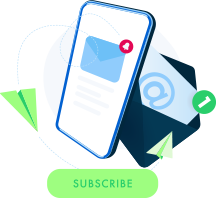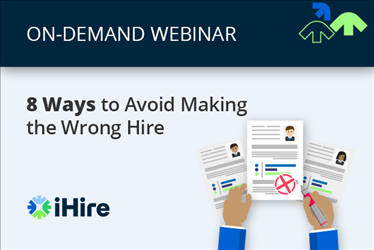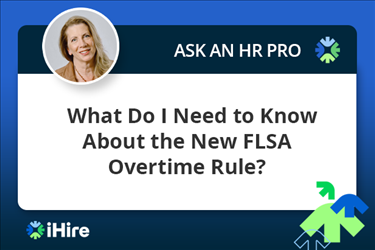- Employer Resources
- |
- Last Updated: April 12, 2024

13 HR Tasks You Can Automate With AI
The human resources department plays a crucial role in any organization, managing personnel, recruitment, payroll, compliance, and more. But, the administrative tasks that go along with HR’s duties can often be time-consuming and resource-intensive. Artificial intelligence (AI) has emerged as a valuable ally in streamlining HR processes, automating routine tasks, and enhancing your overall productivity.
Read on to learn more about how AI can transform HR by automating various tasks, freeing you up to focus on more pressing activities. We will also discuss the best AI tools to use for each task.
AI Tools for HR Professionals
As an HR professional, you can use AI technologies and tools to enhance and streamline various aspects of HR within your organization. Using AI in HR involves applying machine learning, natural language processing, data analysis, and automation to assist you in managing your to-do list more efficiently.
HR AI tools can help automate routine and time-consuming administrative tasks, giving you the freedom to focus on more strategic and value-added responsibilities.
Which Tasks Can You Consider Automating?
There are virtually endless possibilities when it comes to using AI for HR automation. AI can assist in a variety of HR-related realms, including the hiring process and at every stage of the employee lifecycle.
1. Job Ad Writing
You know how important it is to write compelling and accurate job ads; however, this can take a significant amount of time. iHire’s Job Ad Builder and Job Optimizer can help create optimal job ads that are SEO- and mobile-friendly.
2. Resume Screening
You probably spend a significant amount of time reviewing resumes to identify qualified candidates. AI-powered tools, like iHire’s Applicant iScore, utilize algorithms to scan and shortlist resumes based on predefined criteria.
3. Interview Scheduling
Coordinating job interviews with multiple candidates can be a logistical challenge. AI-powered scheduling solutions like Sidekick Ai and Calendly can automate this process by analyzing participants’ schedules and setting up interviews at convenient times. Scheduling automation not only saves time but also provides a seamless experience for candidates.
4. Employee Onboarding
Employee onboarding involves a multitude of administrative tasks, such as setting up user accounts, issuing equipment, and providing training materials. AI-based onboarding platforms like BambooHR and Sana can automate these processes, ensuring that new hires enjoy a smooth transition into the organization.
5. Employee Data Management
Maintaining accurate and consistently updated employee records is essential for HR compliance and decision-making. AI can assist in data management tasks by automating data entry, data validation, and data cleansing. Tools like Leena AI and Walli HR use AI to keep employee records accurate and up to date.

6. Benefits Administration
AI tools can have various uses in benefits administration. For example, some tools can assist employees with deciding on benefits packages by comparing different plans. Other tools can help estimate projected healthcare costs in various scenarios. AI chatbots or virtual assistants can provide real-time, self-service support to employees with questions about their benefits. Benefits administration AI tools such as Alight and Employee Navigator can help relieve some of your burden in HR.
7. Employee Engagement Surveys
Measuring employee engagement is a critical aspect of HR. AI-powered survey platforms like TINYpulse and Microsoft Viva Glint can automatically collect and analyze employee feedback. AI can identify trends, sentiments, and areas that need improvement, allowing you to focus on implementing changes rather than spending valuable time analyzing survey data.
8. Performance Management
AI can assist in performance management by providing data-driven insights. Tools like 15Five and Reflektive use AI to analyze employee performance data, offering recommendations for improvements and development. This not only saves time but also enhances the quality of future performance evaluations.
9. Payroll Processing
Managing payroll can be a time-consuming task that is prone to errors. AI-driven payroll platforms like Symmetrical and Paycor bring automation to calculating salaries, taxes, and deductions. They can ensure accurate and timely payments, reducing the load on HR’s shoulders.
10. Compliance Monitoring
In HR, you are responsible for ensuring that your organization remains in consistent compliance with local labor laws and regulations. AI tools such as ComplyAdvantage and Compliance.ai can monitor regulatory changes and provide timely updates, helping you to stay compliant and avoid costly legal issues.
11. Employee Feedback Analysis
Collecting and analyzing employee feedback is vital for building a healthy workplace culture. AI-powered sentiment analysis tools like Explorance’s MLY and Leapsome can extract insights from employee feedback, making it easier to identify areas for improvement.
Create Your Account Today
12. Talent Development
AI-driven learning platforms like Udemy Business and Coursera for Business can recommend personalized learning paths for employees based on their skills, interests, and career goals. This automation ensures that employees receive relevant training and development opportunities.
13. Offboarding
When employees leave the company, you must perform various offboarding tasks, including deactivating user accounts, gathering exit feedback, and collecting company assets. AI tools such as Tascade and Sanka can automate parts of this process, making it more efficient and error-free.
A Cautionary Note
While AI can significantly enhance and streamline HR operations, it’s essential to consider some key points:
- Data privacy: You should ensure that AI systems adhere to data privacy laws and protect employee data.
- Ethical considerations: Avoid bias in AI decision-making by continuously monitoring and refining AI algorithms.
- Human touch: AI should complement, not replace, the human touch in HR, especially in areas involving employee welfare and relations.
Using AI to Automate HR Tasks
Integrating AI into HR operations offers a transformative opportunity for you to manage your workforce. By automating an array of tasks, from recruitment and onboarding to performance management and compliance monitoring, AI tools can empower you to focus on higher-impact responsibilities. By approaching AI implementation with care and preserving the essential human element in HR, organizations can unlock HR’s full potential, allowing you to dedicate your time and expertise where they are most needed.
If you’re looking for more personalized HR support or assistance beyond what AI can provide, iHire’s Human Resources Services & Consulting can help. Learn more about our customizable solutions and schedule your free consultation today.




